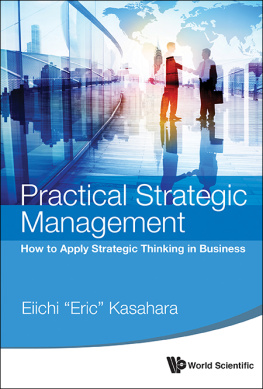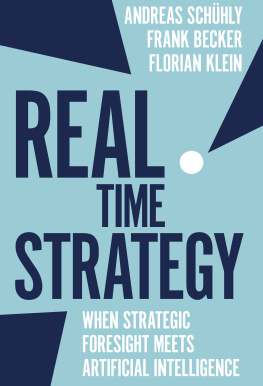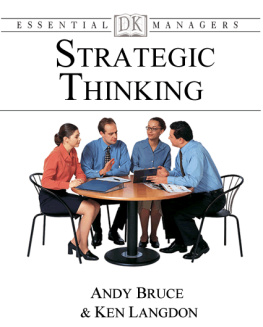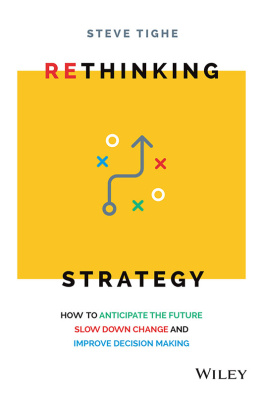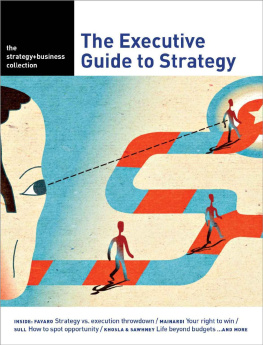Scenario Based Strategy
Scenario Based Strategy
Navigate the Future
PAUL DE RUIJTER
With Henk Alkema
GOWER
Paul de Ruijter 2014
All rights reserved. No part of this publication may be reproduced, stored in a retrieval system or transmitted in any form or by any means, electronic, mechanical, photocopying, recording or otherwise without the prior permission of the publisher.
Published by
Gower Publishing Limited
Wey Court East
Union Road
Farnham
Surrey
GU9 7PT
England
Gower Publishing Company
110 Cherry Street
Suite 3-1
Burlington
VT 05401-3818
USA
www.gowerpublishing.com
Paul de Ruijter has asserted his right under the Copyright, Designs and Patents Act, 1988, to be identified as the author of this work.
British Library Cataloguing in Publication Data
A catalogue record for this book is available from the British Library.
ISBN: 978-1-4724-3717-4 (hbk)
ISBN: 978-1-4724-3718-1 (ebk-ePDF)
ISBN: 978-1-4724-3719-8 (ebk-ePUB)
The Library of Congress has cataloged the printed edition as follows:
Ruijter, Paul de.
Scenario based strategy: navigate the future / by Paul de Ruijter.
pages cm
Includes bibliographical references and index.
ISBN 978-1-4724-3717-4 (hardback) -- ISBN 978-1-4724-3718-1 (ebook) -- ISBN 978-1-4724-3719-8 (epub) 1. Strategic planning. 2. Business planning. I. Title.
HD30.28.R847 2014
658.4012--dc23
2013048247
To Iris
For your love, faith and active support
For making my dreams come true
Contents
List of Figures
Preface
Why another book about strategy? My business and engineering studies at the University of Twente in Enschede were mainly about minding the shop a little less costs, a little more turnover. This was completely the opposite of the idea I had about strategy being proactive and creative, as the youngest son of an entrepreneur. When I was looking for a subject for my Masters thesis, I read an article by Arie de Geus, coordinator of Group Planning at Royal Dutch Shell. He described the way in which Shell was already thinking about the possibility of an oil crisis prior to 1973 and consequently was able to recognize many opportunities when the crisis actually happened. Being proactive, involving the outside world and responding to it; for me that was real strategy!
Inspired by the article by De Geus, I decided I wanted to work with him and Shell. In 1992 I rang his department, Group Planning, but I found out he had already retired. Thanks to his successor I was given the opportunity to work there for six months and I was allowed to write my Masters thesis on how Shell used scenarios to develop strategy. At that time 15 people at Shell had already been working for 18 months on a vision for the future, which resulted in two possible scenarios. These scenarios were presented to more than 1,000 employees in 67 workshops, so they could be used in strategy creation. As the new recruit I was mainly responsible for hanging up flip-charts and typing out the reports, but even in my modest role I was immediately involved in the most difficult part of scenario planning: using scenarios to create a dynamic strategy.
And that is what this book is about: strategy; not military strategy, but organizational strategy. How do you put the future on the agenda of your organization? How do you make your organization deal with this uncertain future and with the outside world? How can your organization contribute to this world? And how do you do that collaboratively with your colleagues? In many organizations people are busy with their own plans, and overlook the significance of contributing to the future and to the outside world. From childhood I learnt I had to use my talents for society, that I had to subordinate my own plans for the greater good, in order to create value for society. In classic books on strategy creating strategy always starts with your own goal. To me this is self-indulgent. It can be done differently, as I learnt at Shell.
A second social obligation which is deeply rooted in my upbringing is personal responsibility. My father never talked about his 30 employees, but about the 30 households for which he felt responsible. It is important to think about the long term: because of your employees, but also because of those to whom you deliver products or services. To me strategy also includes the responsibility to think further ahead. The reality is that everyone in an organization can and should contribute to strategy creation; this also I learnt in 1992.
Feeling personally responsible for putting the outside world and the future on the agenda that sounds like a heavy burden. At the same time it is liberating. By thinking about possible developments in the future before they happen you create space and opportunities. By being ahead of the problem you have alternative options besides sink or swim. This forward-looking approach is much more valuable than solving problems after they have happened or only taking action in response to crises, which is what many managers do. The world is continuously changing. The economic, technological and political winds keep changing direction. A good strategic thinker prepares his or her organization, so it is always ready to tack the words which are shouted on a sailing ship immediately prior to changing direction. Aimless drifting is replaced by goal-oriented navigating. Shells strategy of thinking ahead about a possible oil crisis turned the first oil crisis in 1973 into an opportunity for the company instead of a problem: Shell was ready to tack. The organizations which subsequently followed Shells example enjoyed the same experience. Thus Rabobank was already mentally prepared for a possible economic crisis before 2007 and therefore better equipped than other banks: it was also ready to tack.
To everyone who is not satisfied simply with control and solving problems after they have arrived, but who wants to make a positive contribution to thinking about the future, this book offers the instruments to turn this intention into practice. Scenario Based Strategy: Navigate the Future is written for all strategic thinkers at all levels of the organization: from marketing staff to researchers or human resource advisers. It can be used within commercial organizations, government or trade organizations. This book contains many examples which show how others have undertaken future explorations and how they used these explorations to create a dynamic strategy.
Strategic thinking is a competence which is passed on from generation to generation. I owe a debt of gratitude to those from whom I learned. First of all to my father, and then to the people at Shell who taught me, such as Jaap Leemhuis, Graham Galer and Kees van der Heijden. Later in my career I met Henk Alkema. Henk, who in 1971 created the now famous scenarios about which Pierre Wack and Arie de Geus subsequently wrote. I am proud that he wanted to share knowledge, insights and ideas with me during the long talks and discussions which helped to create this book. Many insights in this book have arisen from my practice. The challenging work for Rabobank has particularly helped to create these ideas. So, I would like to thank Philip Idenburg, Henk Vlessert, Danil Erasmus, Wim Boonstra and Cees Onderwater, with whom I was allowed to bring all this knowledge into practice over the last ten years in several departments at Rabobank. The nautical and military analogies in this book are no coincidence: Martijn Schouten of shipbuilder IHC, and Sebastian Reyn and Captain Kees Turnhout of the Ministry of Defence showed me clearly how old strategic thinking actually is. It is a competence which deserves to be transferred to future generations. I hope this book will contribute to that.
Next page


